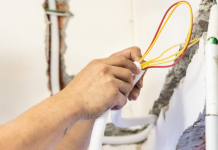Limescale is an unsightly white substance that builds up on pipes and appliances over time, although it’s not harmful. Instead, its presence can compromise the performance of these appliances, rendering them inoperable or unsightly.
Prevention is key when it comes to limescale accumulation; continue reading to learn a few strategies that can help keep limescale at bay.
After going through today’s blog, you can click here to learn how to remove hard water stains from your glass.
Table of Contents
Run Hot Water
If you live in an area with hard water, you may be facing the build-up of limescale deposits — made of calcium and magnesium salts left behind after water has evaporated — that accumulate on household appliances such as taps, shower heads, washing machines and kettles.
Furthermore, limescale accumulation can affect boilers & heating systems negatively and significantly shorten their efficiency and lifespan.
However, simple steps can help stop these scale deposits from forming. One effective method for doing so is running hot water through your pipes daily – this will flush out any residue, keep them looking cleaner for a more extended time, and help prevent scale build-up on appliances.
2. Use Vinegar or Lemon Juice
Hard water evaporates to leave behind a chalky deposit known as limescale, commonly found on faucets, shower heads, basins and toilets. Calcium carbonate (the main constituent) that forms limescale can be broken down using acids such as vinegar or lemon juice as acidic solutions.
You can purchase the descaling products commercially, or a DIY solution containing equal parts white vinegar and baking soda can do the trick. Experts advise pouring one cup of this mixture directly into each toilet bowl, leaving it for 30 minutes, then scrubbing with a toilet brush afterward.
For other surfaces, spray the solution directly onto a cloth and scrub in circular motions until all residue has been broken down; wipe and dry afterward.
3. Clean Your Appliances Regularly
Limescale can be more than an irritation; it can even damage or stop working altogether because its deposits restrict water flow within appliances, forcing them to work harder than necessary and ultimately stop working entirely.
At first, simple cleaning with vinegar or lemon juice may help prevent limescale formation in your home; however, investing in a water softener would be wiser for long-term peace of mind.
To clean your taps, combine half white vinegar and half water in a spray bottle, applying to affected areas before leaving them for one hour before rinsing and wiping dry. For tough limescale deposits on showerheads, try cutting half of a lemon and using it to rub over its surface while using an old toothbrush as you scrub with this method.
4. Wipe Down Wet Fittings After Each Use
Regular use of vinegar or lemon juice will help to prevent mineral build-up in appliances like dishwashers, washing machines and kettles, helping keep them operating at optimal performance.
If you want to take things a step further, installing a water softener could also help remove harmful minerals that cause limescale build-up — keeping pipes and appliances free from damage while protecting them from future problems.
Limescale build-up can be costly for homes and businesses, making removing it time-consuming and expensive. Building operations managers, plant operators, and facilities managers must work hard to prevent their systems from collecting limescale deposits which could cost the business significant amounts in downtime and repairs costs.
Regularly cleaning and wiping down wet fittings is vital in maintaining control and decreasing repair expenses.
5. Clean Your Pipes Regularly
Signs that your home contains hard water are white scaly deposits on faucets, showerheads, and other wet fittings. Cleaning these areas regularly will help avoid this build-up over time.
Baking soda and vinegar can be combined to effectively clean your pipes, helping break down calcium carbonate deposits while leaving them fresh and clean.
Keeping your plumbing fixtures free from limescale is essential to avoiding long-term problems like clogged appliances and low water pressure that it can bring, which are both annoying and costly to address. By following these simple tips, you can prevent these expensive fixes altogether.
















